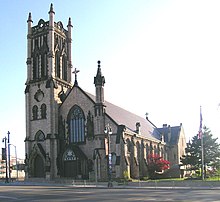St. John's Episcopal Church (Detroit, Michigan)
| St John's Episcopal Church | |
|---|---|
 |
|
| Denomination | Episcopal Church USA |
| Churchmanship | High Church |
| Website | www.stjohnsdetroit.org |
| History | |
| Dedication | Saint John the Apostle |
| Administration | |
| Diocese | Episcopal Diocese of Michigan |
| Province | V |
| Clergy | |
| Rector | The Rev. Steven Kelly, SSC |
| Curate(s) | Vacate |
| Assistant | The Rev. Michael Bedford, SSC |
| Laity | |
| Organist/Director of music | Dr. Huw R. Lewis, FRCO |
|
St. John's Episcopal Church
|
|
| Location | 2326 Woodward Avenue Detroit, Michigan |
| Coordinates | 42°20′23.51″N 83°3′8.84″W / 42.3398639°N 83.0524556°WCoordinates: 42°20′23.51″N 83°3′8.84″W / 42.3398639°N 83.0524556°W |
| Built | 1859 |
| Architect | Jordan & Anderson |
| Architectural style | Gothic Revival |
| MPS | Religious Structures of Woodward Ave. TR |
| NRHP Reference # | 82002906 |
| Significant dates | |
| Added to NRHP | August 3, 1982 |
| Designated MSHS | June 10, 1987 |
St. John's Episcopal Church is an antebellum-era church located at 2326 Woodward Avenue (at the corner of Woodward and the Fisher Freeway service drive) in Downtown Detroit, Michigan. It is the oldest church still standing on Woodward Avenue, an area once called Piety Hill for its large number of religious buildings. The church was listed on the National Register of Historic Places in 1982 and designated a Michigan State Historic Site in 1987.
The parish of St. John's was organized in Detroit in 1858, primarily due to the efforts of Henry Porter Baldwin, a successful merchant who later became governor of Michigan and a United States senator. Porter purchased and donated the property, which was then on the northern outskirts of Detroit's city limits at the corner of Woodward and High Street (now Interstate 75). He also donated the money to build a rectory and a 150-seat chapel, designed by Jordan & Anderson.
When the chapel was dedicated in 1859, it proved too small for the burgeoning congregation. A new church was commissioned from Jordan & Anderson and quickly constructed; it was consecrated on December 10, 1861.
Today the church congregation is unusual among those of the modern Episcopal Church, as it uses the traditional 1928 edition of the Book of Common Prayer. Some weekday services use the Anglican Missal, rather than the newer 1979 edition Book of Common Prayer.
St. John's is an example of Victorian Gothic Revival architecture, measuring 170 feet by 65 feet. The belfry, the tallest section of the building, rises 105 feet. The bulk of the exterior is rubble limestone, with the trim made of Kelly Island sandstone. The side walls and roof are supported by buttresses and hammer beam trusses. Decorative gargoyles festoon the roof line and hood moldings above the windows and doors. The interior has galleries cantilevered on three sides; originally there were no intermediary piers to support the roof, giving the church an auditorium feel.
...
Wikipedia
